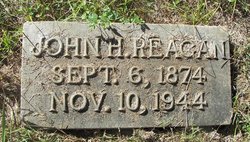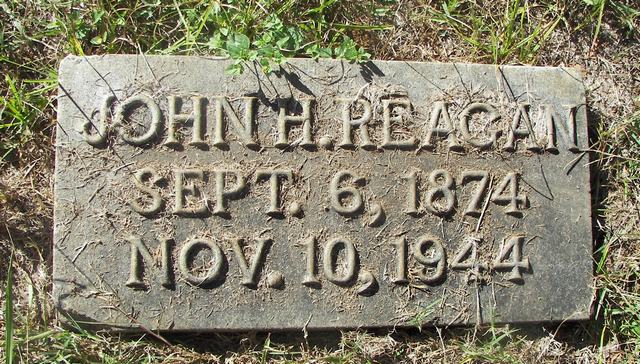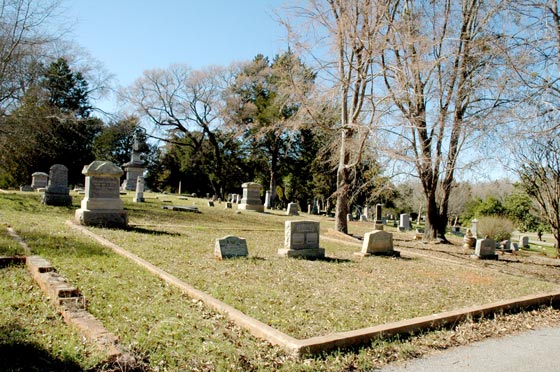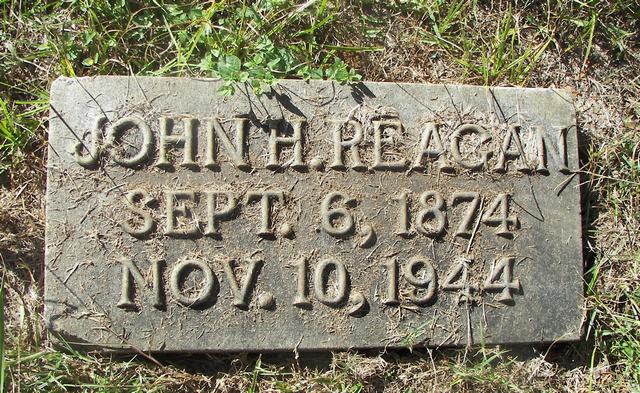----
As the name heading this sketch is contemplated, thoughts clamor for expression "like a bell to ring with, once being touched," causing the author of this book to pause aghast. How can one write, as a mere detail, in a work containing so many other sketches, of a life so purposeful, so fruitful, so sublime? Why, volumes could be written about John H. Reagan alone!
To obtain a complete picture, one needs to go back to that October 8, 1818. when, in an unpretentious home in Sevier County, Tennessee, a baby boy first saw the light. He was christened John H. Reagan and the fairy Godmother who presided at the event decreed: "He shall live long: he shall travel far; he shall leave the world the richer for having trod its paths."
How one would enjoy delving into the child-hood of such a man! Even the first words spoken, the first lessons learned, the first tasks accomplished, might prove prophetic of the pinnacle to which his first stumbling steps so certainly pointed. But one must hasten on.
In 1839, young Reagan came to Texas. The Alamo, Goliad, San Jacinto had stirred his soul. The "Father of Texas" had, like a tired child, fallen asleep. Did that Divinity which "shapes our ends." deliberately signal out this loyal young Tennesseean to take the place of the immortal Austin? The devout student of history likes to think so. Certain it is that John H. Reagan gravitated to Texas, as the needle to the pole. The thought of Texas, a part from John H. Reagan from the year of his arrival to that of his death in 1905, is as unnatural as would be any thought of an Austinless Texas, prior to 1836.
Arrived in the new Republic, Reagan was prompt to rendervaluable services to the new home. As Deputy Surveyor of Public Lands, he maintained headquarters at Nacogdoches, from there working north and west. Indians infested the territory to be surveyed, and numerous encounters with the red men kept the little band busy. One particularly fierce struggle occurred at the present site of Grand Saline, in Van Zandt County. After the smoke of battle had cleared away, all but five of the surveying party decided to return to civilization, each evidently feeling that his scalp was more precious than any emolument that might accrue to him from further land surveys. Reagan unmoved in his determination to "get his job done," pushed on with his remaining five. Flour, coffee, some tin cups, the compass and chain, his field book, hatchet, and gun providing all the preparation available for either the wilderness or further savage encounters. In such manner, Kaufman, Henderson, and Van Zandt counties were surveyed.
Aside from mere mention, to follow Reagan's long eventful career, step by step, is not within the scope of this sketch. Besides, it is history. To repeat would only remind the reader of well known facts that, while pleasant, are in no way necessary to a proper appreciation of the man. To dilate on his having been for four years the "right hand man" in the cabinet of that great figure, Jefferson Davis, the President of the Confederate States of America, would be about as necessary as the complete account of his visit to France would be to a proper estimate of Benjamin Franklin.
Step by step, Reagan advanced - a seat in the State legislature in 1847 following the surveying experiences, this in turn giving place in 1852 to the office of District Judge. Serving with distinction in this capacity, the next logical step was to the Congressional Halls at Washington, where in 1857 he was sent by the first District of Texas, to be re-elected in '59.
Events moved rapidly from then on. In 1861 the Secession Convention turned Texas' world up-side down. Reagan naturally took a leading part, and was chosen Deputy to the Provisional Government of the Confederacy. In 1861 he was made Postmaster General of the Confederacy, discharging these duties for the four years of the conflict between the states. In addition, he served for a short period as Secretary for the Confederate States Treasury. In 1875 he was member of the State Constitutional Convention. Election to the 44th, 45th. and 46th Congresses followed and membership on Texas' Railroad Commission rounded out his career of public service which had extended over so long a period.
One personal glimpse may not be amiss just here: It was a beautiful sunny day in the Summer of 1904. The writer, one of a party, drove out to Fort Houston, the beautiful home where the South's "grand old man" now retired from public life, spent his last and happiest days. Arrived at the gate, before we had alighted from the carriage, a dignified, snowy haired figure was seen coming down the walk. Other members of the household followed. Cordial greetings, which visitors invariably received at this hospitable home were extended, special attention being paid to a chubby ten month's old baby in the arms of his mother (one of the visitors). Invitations were extended, arms were held out. The baby, naturally a friendly soul, hesitated, looking from one smiling face to another. How could he choose, from so many lovely strange persons? Now Judge Reagan had been noparty to all this cajoling. "You will frighten him," he remonstrated, when, to the amazement of all. himself in particular, all doubt vanished, the little visitor made his choice - he literally fell on the breast of the sole survivor of Jefferson Davis' Cabinet! The great statesman, a power in legislative halls, a tower of strength to a harassed friend, or country, inspired confidence in young and old. Naturally, this timid child, bewildered by too many strangers, instinctively turned to him, certain of protection.
To visit in his home was a rare privilege, not soon to be forgotten by the friends made welcome there. It was his delight to exhibit, to interested visitors, his treasures, rare curios, priceless books, valuable keepsakes, gifts of admirers from far and near. Better yet, he exhibited, with never ending pride, his wide fertile fields. These yielded him ever increasing delight to the end. Every guest was met at the steps, or gate, and all were escorted to their equipages, on departure. Rarely does one encounter a host who more truly knew how to "Welcome the coming, speed the parting guest" than John H. Reagan. This hospitality, exhibited also in unbounded measure by his delightful family, naturally led to Fort Houston becoming a Mecca for an endless stream of admiring callers. Others, approaching the nineties, might have tired of the incessant claims on time and strength. Not so, Judge Reagan. To the last, every guest found him cordial, hospitable, eager, exactly as though the visit proved as great a delight to the host as to the visitor.
One more personal glimpse: The writer had spent her first night at Fort Houston and awoke with a feeling of sadness that the delightful visit must terminate shortly after breakfast. "Probably the Judge sleeps late," she thought."I should have made my adieux last night." Hopping up, she looked down from her window to the garden.
The sun was just peeping over the horizon, its tender rays touching an impressive figure. The object of her thoughts,the venerable, gracious head of the household, walked among his flowers, drinking in the beauty of a great riot of bloom. Fascinated, the visitor gazed, the sheer delight with which the unconscious object of her regard contemplated his treasures etching an indelible picture on her mind. He loitered from plant to plant, pausing to regard, here a graceful cluster, there a solitary bloom."Can this be the man." the gazer asked herself." who so fearlessly exposed himself to the perils of Indian encounters? Who so indomitably swayed the Secession Convention? Who spent countless sleepless nights with his chief, wrestling over the ever increasingly overwhelming problems of the "Lost Cause?"
As she pondered, the figure in the garden paused before one particularly irresistible blossom. Lovingly he touched it, bent to inhale its fragrance, was turning away, but paused, reached in his pocket for his knife, severed the bloom, a long stemmed, crimson rose, from the parent plant. The watcher turned from her window. Suddenly, she wanted a share in the delights of that garden. But a toilet must be made and hurry though she did. the breakfast bell rang and the charming daughter of the house presented herself as escort to the dining room. Disappointed, the visitor allowed herself to be led below. But the coveted "delights of the garden" were hers, afterall. A full blown crimson rose, glistening with dew. lay on her plate!
Today, as the incident lives in memory, the picture takes on new proportions; that rose, chosen so carefully and bestowed so charmingly, typifies the life of its donor. From Texas' "garden of the Great," it too was culled not many years later. Full blown, gorgeous, with the perfection produced by a long life of purposeful, righteous service, yet gleaming with the dew of human understanding and love, the Master Hand plucked it. A place in "Mansions Above" received it. And Texas ennobled, enriched, beautified for all time by the Giant flower which for sixty-six years grew in her soil, will, like the recipient of the red rose plucked from Fort Houston's garden. "Never forget." [A Centennial History of Anderson County, Texas" SanAntonio, Tex.: Naylor Co., 1936]
----
As the name heading this sketch is contemplated, thoughts clamor for expression "like a bell to ring with, once being touched," causing the author of this book to pause aghast. How can one write, as a mere detail, in a work containing so many other sketches, of a life so purposeful, so fruitful, so sublime? Why, volumes could be written about John H. Reagan alone!
To obtain a complete picture, one needs to go back to that October 8, 1818. when, in an unpretentious home in Sevier County, Tennessee, a baby boy first saw the light. He was christened John H. Reagan and the fairy Godmother who presided at the event decreed: "He shall live long: he shall travel far; he shall leave the world the richer for having trod its paths."
How one would enjoy delving into the child-hood of such a man! Even the first words spoken, the first lessons learned, the first tasks accomplished, might prove prophetic of the pinnacle to which his first stumbling steps so certainly pointed. But one must hasten on.
In 1839, young Reagan came to Texas. The Alamo, Goliad, San Jacinto had stirred his soul. The "Father of Texas" had, like a tired child, fallen asleep. Did that Divinity which "shapes our ends." deliberately signal out this loyal young Tennesseean to take the place of the immortal Austin? The devout student of history likes to think so. Certain it is that John H. Reagan gravitated to Texas, as the needle to the pole. The thought of Texas, a part from John H. Reagan from the year of his arrival to that of his death in 1905, is as unnatural as would be any thought of an Austinless Texas, prior to 1836.
Arrived in the new Republic, Reagan was prompt to rendervaluable services to the new home. As Deputy Surveyor of Public Lands, he maintained headquarters at Nacogdoches, from there working north and west. Indians infested the territory to be surveyed, and numerous encounters with the red men kept the little band busy. One particularly fierce struggle occurred at the present site of Grand Saline, in Van Zandt County. After the smoke of battle had cleared away, all but five of the surveying party decided to return to civilization, each evidently feeling that his scalp was more precious than any emolument that might accrue to him from further land surveys. Reagan unmoved in his determination to "get his job done," pushed on with his remaining five. Flour, coffee, some tin cups, the compass and chain, his field book, hatchet, and gun providing all the preparation available for either the wilderness or further savage encounters. In such manner, Kaufman, Henderson, and Van Zandt counties were surveyed.
Aside from mere mention, to follow Reagan's long eventful career, step by step, is not within the scope of this sketch. Besides, it is history. To repeat would only remind the reader of well known facts that, while pleasant, are in no way necessary to a proper appreciation of the man. To dilate on his having been for four years the "right hand man" in the cabinet of that great figure, Jefferson Davis, the President of the Confederate States of America, would be about as necessary as the complete account of his visit to France would be to a proper estimate of Benjamin Franklin.
Step by step, Reagan advanced - a seat in the State legislature in 1847 following the surveying experiences, this in turn giving place in 1852 to the office of District Judge. Serving with distinction in this capacity, the next logical step was to the Congressional Halls at Washington, where in 1857 he was sent by the first District of Texas, to be re-elected in '59.
Events moved rapidly from then on. In 1861 the Secession Convention turned Texas' world up-side down. Reagan naturally took a leading part, and was chosen Deputy to the Provisional Government of the Confederacy. In 1861 he was made Postmaster General of the Confederacy, discharging these duties for the four years of the conflict between the states. In addition, he served for a short period as Secretary for the Confederate States Treasury. In 1875 he was member of the State Constitutional Convention. Election to the 44th, 45th. and 46th Congresses followed and membership on Texas' Railroad Commission rounded out his career of public service which had extended over so long a period.
One personal glimpse may not be amiss just here: It was a beautiful sunny day in the Summer of 1904. The writer, one of a party, drove out to Fort Houston, the beautiful home where the South's "grand old man" now retired from public life, spent his last and happiest days. Arrived at the gate, before we had alighted from the carriage, a dignified, snowy haired figure was seen coming down the walk. Other members of the household followed. Cordial greetings, which visitors invariably received at this hospitable home were extended, special attention being paid to a chubby ten month's old baby in the arms of his mother (one of the visitors). Invitations were extended, arms were held out. The baby, naturally a friendly soul, hesitated, looking from one smiling face to another. How could he choose, from so many lovely strange persons? Now Judge Reagan had been noparty to all this cajoling. "You will frighten him," he remonstrated, when, to the amazement of all. himself in particular, all doubt vanished, the little visitor made his choice - he literally fell on the breast of the sole survivor of Jefferson Davis' Cabinet! The great statesman, a power in legislative halls, a tower of strength to a harassed friend, or country, inspired confidence in young and old. Naturally, this timid child, bewildered by too many strangers, instinctively turned to him, certain of protection.
To visit in his home was a rare privilege, not soon to be forgotten by the friends made welcome there. It was his delight to exhibit, to interested visitors, his treasures, rare curios, priceless books, valuable keepsakes, gifts of admirers from far and near. Better yet, he exhibited, with never ending pride, his wide fertile fields. These yielded him ever increasing delight to the end. Every guest was met at the steps, or gate, and all were escorted to their equipages, on departure. Rarely does one encounter a host who more truly knew how to "Welcome the coming, speed the parting guest" than John H. Reagan. This hospitality, exhibited also in unbounded measure by his delightful family, naturally led to Fort Houston becoming a Mecca for an endless stream of admiring callers. Others, approaching the nineties, might have tired of the incessant claims on time and strength. Not so, Judge Reagan. To the last, every guest found him cordial, hospitable, eager, exactly as though the visit proved as great a delight to the host as to the visitor.
One more personal glimpse: The writer had spent her first night at Fort Houston and awoke with a feeling of sadness that the delightful visit must terminate shortly after breakfast. "Probably the Judge sleeps late," she thought."I should have made my adieux last night." Hopping up, she looked down from her window to the garden.
The sun was just peeping over the horizon, its tender rays touching an impressive figure. The object of her thoughts,the venerable, gracious head of the household, walked among his flowers, drinking in the beauty of a great riot of bloom. Fascinated, the visitor gazed, the sheer delight with which the unconscious object of her regard contemplated his treasures etching an indelible picture on her mind. He loitered from plant to plant, pausing to regard, here a graceful cluster, there a solitary bloom."Can this be the man." the gazer asked herself." who so fearlessly exposed himself to the perils of Indian encounters? Who so indomitably swayed the Secession Convention? Who spent countless sleepless nights with his chief, wrestling over the ever increasingly overwhelming problems of the "Lost Cause?"
As she pondered, the figure in the garden paused before one particularly irresistible blossom. Lovingly he touched it, bent to inhale its fragrance, was turning away, but paused, reached in his pocket for his knife, severed the bloom, a long stemmed, crimson rose, from the parent plant. The watcher turned from her window. Suddenly, she wanted a share in the delights of that garden. But a toilet must be made and hurry though she did. the breakfast bell rang and the charming daughter of the house presented herself as escort to the dining room. Disappointed, the visitor allowed herself to be led below. But the coveted "delights of the garden" were hers, afterall. A full blown crimson rose, glistening with dew. lay on her plate!
Today, as the incident lives in memory, the picture takes on new proportions; that rose, chosen so carefully and bestowed so charmingly, typifies the life of its donor. From Texas' "garden of the Great," it too was culled not many years later. Full blown, gorgeous, with the perfection produced by a long life of purposeful, righteous service, yet gleaming with the dew of human understanding and love, the Master Hand plucked it. A place in "Mansions Above" received it. And Texas ennobled, enriched, beautified for all time by the Giant flower which for sixty-six years grew in her soil, will, like the recipient of the red rose plucked from Fort Houston's garden. "Never forget." [A Centennial History of Anderson County, Texas" SanAntonio, Tex.: Naylor Co., 1936]
Gravesite Details
Headstone photo courtesy of East Texas Genealogical Society. Taken C. 2007.
Family Members
Sponsored by Ancestry
Advertisement
Advertisement











